This just in, antibiotic resistance doesn’t spread through meat products.
Researchers from Colorado State University wanted to know if antibiotics used in cattle select for resistant bacteria that could be transferred to humans. The fear is that nonpathogenic bacteria could pass on resistance genes to pathogenic bacteria (through horizontal, or lateral transfer), thus making infections difficult to treat.
The group expected that antibiotics would increase resistome diversity in cattle. (The resistome consists of all the resistance genes found in a given sample.) They found that, surprisingly, resistome diversity decreased during the process of beef production.
They measured the resistome in animals when they first entered the feedlot and when they were sent to slaughter. They also measured the resistome in market-ready meat products. According to the study, “several groups of resistance genes that were detected when the cattle first arrived in the feedlot were not detected at all at the end of the feedlot period. However, some resistance genes were detected throughout the feedlot period, and these tended to be resistance genes that allow the bacteria to evade the same antibiotics that were used in the cattle”.
Importantly, no resistance genes were found in market-ready meat products, indicating that these products are efficiently sanitized before they hit the shelf. This study suggests, instead, that policy makers should focus on the spread of drug-resistant bacteria between humans and farm animals in the period leading up to slaughter.
Sources: EurekAlert,
eLIFE









